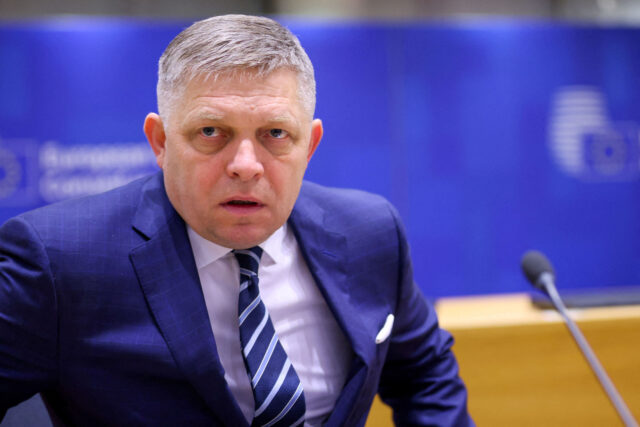Slovakia will not implement the European Union’s new migration system, Prime Minister Robert Fico has said. Approved by the European Parliament last week, the bloc’s new migration pact promises to shorten security and asylum procedures and increase returns to reduce unwanted immigration from the Middle East and Africa, a high priority for the EU.
After eight years of feuds between the bloc’s 27 member states, the pact lays out a delicate balance of rights and obligations between arrival countries such as Italy and rich destinations such as Germany.
Billed by the EU as a major win addressing concerns among citizens ahead of European Parliament elections in June, it allows countries unwilling to host any of the mostly Muslim new arrivals to pay instead.
“We are saying unequivocally that you cannot order a country that it must accept, in the Slovak case, up to 300 migrants you know nothing about, or pay 20,000 euros per each,” Fico told a press conference after visiting the foreign ministry. “That is not solidarity, that is dictate,” said Fico, adding that his Smer-SSD party and Slovakia’s ruling coalition would vote against related laws in the national parliament.
To enter into force for the entire EU, the agreement must still be rubber-stamped by member countries that would then have two years to implement it. The package is expected to win the necessary majority when EU countries vote on it, something an official said was now expected in early May though a final date had yet to be set.
The EU—a wealthy bloc of some 450 million inhabitants—has been seeking to reduce irregular immigration since more than a million people, mostly Syrian refugees, arrived across the Mediterranean in 2015. Fewer than 48,000 people got in so far this year, according to UN data.
Fico’s comments come after Poland also rejected the rules for sharing out between EU states the task of hosting refugees and migrants arriving outside of regular border crossings.
Hungary was also against, a government spokesman said last week, adding Budapest considered the system “not workable”.
“It’s doomed to fail,” Zoltan Kovacs told journalists.
Warsaw, Bratislava and Budapest are far short of votes to sink the deal on their own. Member states that violate shared laws can be sued by the bloc’s executive European Commission and eventually be fined by the top EU court, the European Court of Justice. All three countries have lost migration cases there before.
Since taking power in Slovakia for the fourth time, Fico has spoken out against some EU policies, including on Russia’s war in Ukraine, as well as seeking to engage more with China.
At the same time, his changes to the judiciary at home have raised concern over damaging democracy in Slovakia, something that could hurt the flow of EU funds to the country of nearly 5.5 million people in the bloc’s east.
With inputs from Reuters
At six feet and over, cool, calm and always collected. Never a hair out of place. He is the high priest of editorial facts, grammar is his baby and headlines are meat on the bone. Loves samosas and cricket, tracks Twitter and when in his cups, nothing better than Jagjit Singh’s ghazals.





